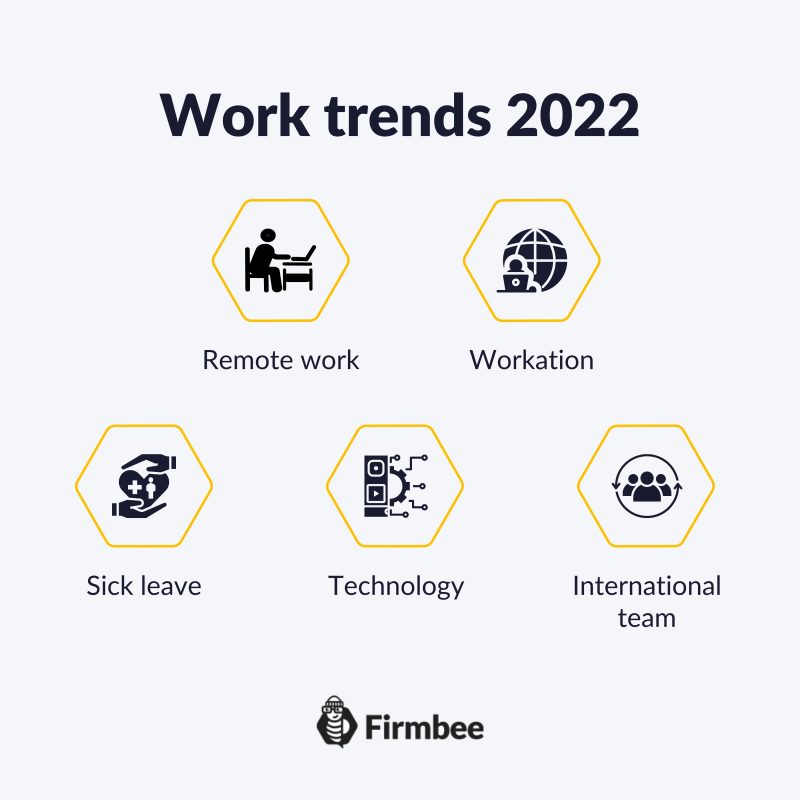Let’s take a look at the future work trends. The COVID-19 pandemic has caused changes in various areas of daily life. It has made e-commerce flourish, and thus consumers have become accustomed to the speed and convenience of online shopping, and even started to use it more readily than before. Now, people appreciate health and the possibility to connect with loved ones more than they did in the past. The aforementioned changes have had a great impact on the labor market. Read on.
5 future work trends after Covid-19 – table of contents:
Remote work
Before the pandemic, few people had the opportunity to work remotely – just 7% of employees globally. Now it is simply standard in several companies. Most Gen Zers (the youngest employees) feel that remote work is very important to them. The possibility to work from home has become a benefit that can’t be taken away.
It has become an expectation to which employers must respond if they want to attract new or retain current employees. The pandemic has clearly shown that the efficiency of working from home is similar to working in the office, thus making flexibility in the workplace simply affordable.
Workation
Business profiles on LinkedIn are increasingly flooded with lengthy #workation posts praising companies that allow remote work over an extended period (e.g., weekly or even monthly). While it cannot be denied that working remotely abroad comes with technical issues (e.g., insurance, accidents, etc.), it certainly provides the freedom that some people want – especially if they need nothing more than a laptop and Internet access to perform their duties, which is not a problem in most parts of the world.
Working during the day and relaxing and exploring new places in Spain, Italy or France after work– this is what more and more employees are striving for, and they will certainly appreciate companies that provide such freedom. It should be noted that such a trend may also lead to pathologies such as the reluctance to take a real vacation or rest at home.

Sick leave
Showing up sick to work, which often ended in positive test results for coronavirus and the need to examine more people, send them to isolation, and exclude them from work, has made us approach the subject of our health with more concern – and employers must take this aspect into account as well.
Sick leave is the employee’s right, not the employer’s courtesy, although this type of pathology occurs in many workplaces. When such situations took place in the pandemic, the consequences for companies were often severe (shutting down half the office, halting production). Nowadays, we care more about our health and know that we are more effective when we recover.
Technology
Generation Z includes people born at the end of the last century and after 2000 (the so-called post millenials, zetas, zoomers), who have entered the job market more recently (after graduation) or are only slowly making their way into it, bringing a whole new standard to the workplace.
They are often defined as the first digital generation, and they are the ones who find it easy to work in today’s world, which has transformed very quickly. Employers who want to attract the young in the post-Covid era must therefore bet on technology – point out what is already used and show that they are open to new solutions.
International team
This trend is inextricably linked to the shift to hybrid or remote work and the employees’ desire to perform work duties and rest at the same place. In practice, it means an openness to employees coming from abroad. The pandemic has shown (and this will no longer be reversed) that such a situation can allow certain goals to be achieved.
For example, working in different time zones has ceased to be a problem. If all time zones are covered, then the company can serve its customers 24/7 without the need for late-night shifts. Thus, employers are gaining more and more opportunities in hiring, while increasing diversity in the workplace.

Work trends – summary
The trends listed above are likely to shape the labor market to the great extent in 2022 – the new post-Covid reality. Business owners and HR specialists need to be aware of the changes in employees’ expectations, attitudes to work or aspirations the pandemic has caused. Only in this way will they be able to respond to the employees’ demands, both during recruitment processes and throughout their whole employment.
You’ve just learned more about future work trends. Read also: What is peer-to-peer feedback?
If you like our content, join our busy bees community on Facebook, Twitter, LinkedIn, Instagram, YouTube, Pinterest.
Author: Nicole Mankin
HR manager with an excellent ability to build a positive atmosphere and create a valuable environment for employees. She loves to see the potential of talented people and mobilize them to develop.


















